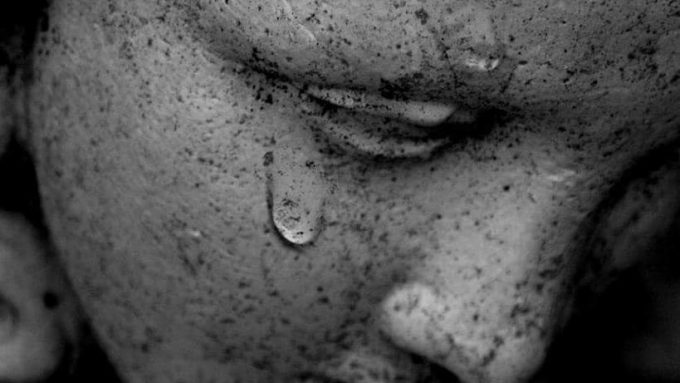 In ancient Greece, men know each other and recognize each other in the eyes of their family, their loved ones, their community. Women reserve the mirror for themselves, which is about beauty, femininity and seduction. Reflection is everywhere. "There is no place that does not see you" summarizes Rilke. Can we exist without worrying about our reflection? Can we be aware of ourselves without knowing ourselves? Can one be aware of oneself without being recognized? One can have a self-image, but it can be very far from oneself. Thus man should not see himself in the mirror for fear of being absorbed by his image. This image that manages to make us forget that we are there. If we think what we see, if it resonates with us, we dream it too. Our image escapes us as soon as we see it. Thus the woman adjusts herself in the mirror when the man could get lost there, drown there. The dream, binomial of memory, conceals time and numbs it. What did we see and when? The gaze and the imagination interpenetrate and cannot be dissociated. To see and to know oneself merges among the Greeks. To see, to know oneself... but not too much, because if man is a marvel, in the sense of an incident, of a fascinating fracture within the living as the chorus of Antigone says, he also conceals his own terror, he exterminates and tortures himself, and he is indeed the only "animal" in this case.
In ancient Greece, men know each other and recognize each other in the eyes of their family, their loved ones, their community. Women reserve the mirror for themselves, which is about beauty, femininity and seduction. Reflection is everywhere. "There is no place that does not see you" summarizes Rilke. Can we exist without worrying about our reflection? Can we be aware of ourselves without knowing ourselves? Can one be aware of oneself without being recognized? One can have a self-image, but it can be very far from oneself. Thus man should not see himself in the mirror for fear of being absorbed by his image. This image that manages to make us forget that we are there. If we think what we see, if it resonates with us, we dream it too. Our image escapes us as soon as we see it. Thus the woman adjusts herself in the mirror when the man could get lost there, drown there. The dream, binomial of memory, conceals time and numbs it. What did we see and when? The gaze and the imagination interpenetrate and cannot be dissociated. To see and to know oneself merges among the Greeks. To see, to know oneself... but not too much, because if man is a marvel, in the sense of an incident, of a fascinating fracture within the living as the chorus of Antigone says, he also conceals his own terror, he exterminates and tortures himself, and he is indeed the only "animal" in this case.
Month: October 2021
Gregorian Chant
It was in June 1985, in Pont-à-Mousson, at the end of the conference "Music in the Church of today". Maurice Fleuret - in peace be his soul -, the magnificent director of music and dance of Minister Jack Lang, spoke. Word of fire. Supplication; We can say it, since he himself begged. I will quote it ad Sensum, but that word I have never forgotten it: it is from him. Referring to what Western music, from the origins to the present day, owed to the Church, to the liturgy of the Church, what the music of the Church of Monteverdi, Bach, Mozart was due to the Music of the Church. , from Beethoven, Stravinski, Messiaen: everything . To the liturgical music of the Church, Western music had everything, he said. And himself, Maurice Fleuret, in his own musician life, to the music of the Church, what should he have? All . He owed him everything, he said. And this Western music which owed everything to the Church, at the liturgy of the Church, what should it have in Gregorian singing? Everything , he said. In the Gregorian chant, all Western music, he said, owed everything . But the spirit of the Gregorian chant, he says, this spirit which he could not imagine that he stopped blowing, where did he breathe? In the liturgy, he said. And it was at this moment that he begged the Church ...: I beg you, he exclaimed, for the ecclesiastics present, do not leave the state the monopoly of the Gregorian chant. It is made for the liturgy. And it is in the liturgy that it must be practiced. »»
Even if the Gregorian is sung less (when Vatican II recommended it as the major chant of the liturgy, go figure), it remains the treasure of Europe. Maurice Fleuret, pupil of Olivier Messiaen and minister of Jack Lang, recalled it precisely above. The Gregorian was omitted by those who promulgated it, so it is difficult to see clearly. Those who take the time to go on retreat in monasteries or who, out of taste, listen to Gregorian chant know that it wins over believers and non-believers alike. The Gregorian turns out to be unclassifiable. Rooted and distant, powerful and delicate, humble and solemn, fragile and vigorous. Brother Toussaint, former monk of the Sainte Madeleine du Barroux abbey, now a hermit, offers Gregorian courses à la carte and whatever your level. He is an excellent teacher, and I can attest to that!
Brother Toussaint offers you very flexible formulas. You can follow the courses remotely or come on site (the Saint-Bède hermitage is located between Lyon and Grenoble). For the moment, he cannot yet accommodate anyone, even if in the long term he would like to build a small hostelry to receive guests... There are accommodations not very far from the hermitage. Anyone who knew Barroux in its early days knows the secret but avowed desire of Brother Toussaint to recreate this unique atmosphere and to receive a few guests to immerse them in almost perpetual prayer. In the immediate future, it is a good idea to start by learning to sing, which gives Brother Toussaint time to find the funds to increase his structure (patrons are welcome here!). The prices are decreasing if you come with several people. One hour, three days, all formulas are possible. Brother Toussaint will gladly come out of his eremitism to teach you the art of Gregorian chant.
Information: Learn Gregorian chant with a Benedictine monk
Reservations: https://frere-toussaint.reservio.com/
And the complete site where you can discover Brother Toussaint's articles on eremitism: https://www.ermites-saint-benoit.com/
The Pump by Clive Staples Lewis

"In the first place, you must get rid of that nauseating idea, the fruit of an inferiority complex manifesto and a worldly mind, that pomp, in the right circumstances, has anything in common with vanity or sufficiency. A celebrant who solemnly approaches the altar to celebrate, a princess led by her king in a noble and delicate minuet, a senior officer reviewing the honored troops during a parade, a butler in livery bringing food lavish at a Christmas banquet — all wear unusual attire and move with calculated and impeccable dignity. This does not mean that their gestures are in vain, rather docile; their gestures obey an imperative that presides over every solemnity. The modern habit of practicing ceremonies without any etiquette is no proof of humility; rather, it proves the powerless celebrant's inability to forget himself in the service, and his readiness to rush and spoil the pleasure proper to the ritual of placing beauty at the center of the world and making it accessible to him. »
Free translation by the blog author.